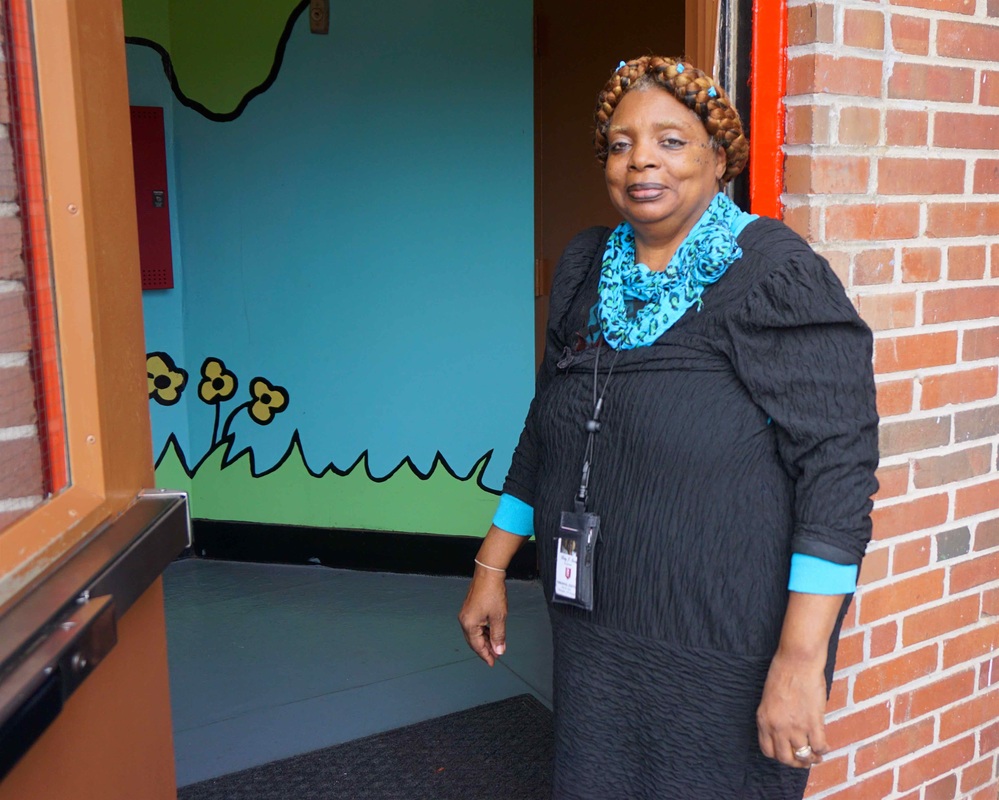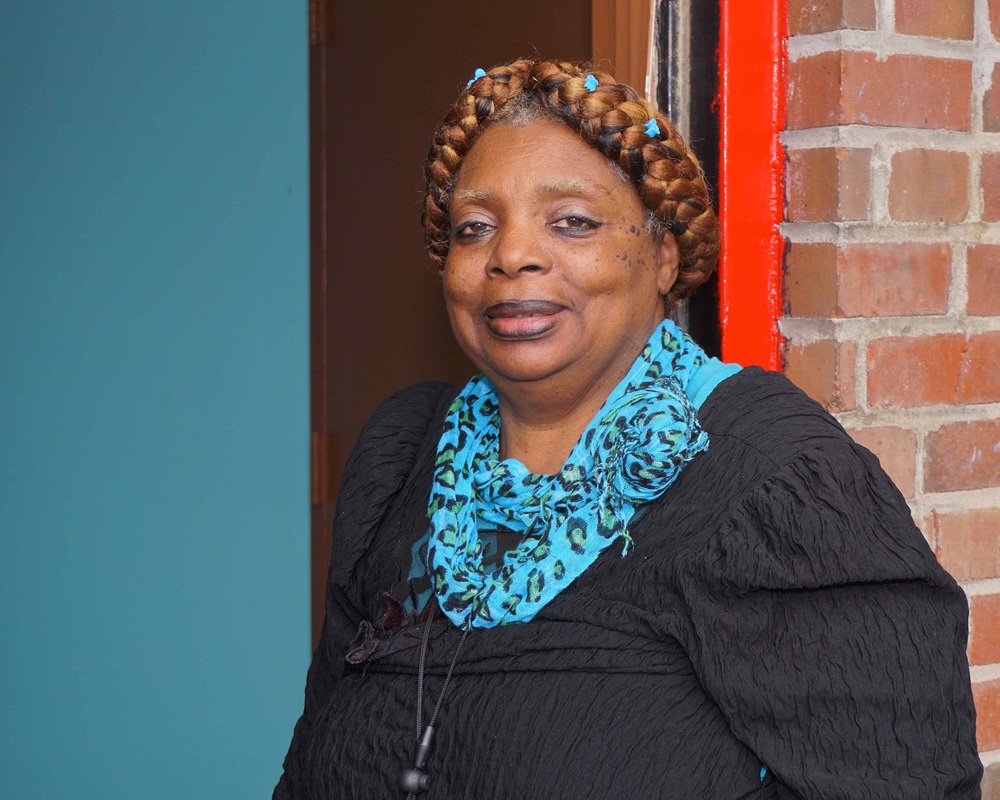“I grew up in Lemoyne Gardens in the 50’s and 60’s. Everything was safe then. You could sleep outside or with the doors open and you didn’t worry about anybody coming in or bothering you. You could walk anywhere by yourself and think nothing of it. I remember those old-fashioned cars, the kind with two doors, and I remember when milk was delivered to the doorstep in bottles. Back then, they brought around big blocks of ice that we put in a box, and that’s how we kept food cold. That was the icebox, and I still call it that. My grandchildren correct me and say, ‘Grandmama, it’s a refrigerator, not an icebox!’ but I can’t get out of calling it that. We had a corner store in the neighborhood, and drinks were ten cents. Everything was cheap then. They used to have a big ole bus that came around and got all the people at 5:00 in the morning when it was still dark, and we’d go and pick cotton. That’s how my mama made our money. There wasn’t anybody to keep the children, so the children had to go with the parents. I couldn’t tell you now where the cotton fields were; I don’t remember. But I remember getting on that bus and going when I was little.
“Where we lived was all black, so I didn’t know any white people growing up. There was a Catholic Church across the street, and we’d see them going in and out, but that’s about all the white people we ever saw. Most all of us went to a black church, Metropolitan Baptist, which is still there. I didn’t know much about what was going on between blacks and whites because we never left the neighborhood. We had everything we needed right there. But I remember how excited everybody was over Martin Luther King. They said it was amazing that we had somebody who was strong for us. That’s all anybody ever talked about. He brought hope. People said the world was going to change because of him, but I didn’t really understand what that meant.
“I was going to Hamilton High School when King was killed. All our people just went crazy, tearing things up, breaking stuff, going in stores and taking things, setting buildings on fire, just taking control. They even set the only library we had, the one on Vance, on fire. Everybody was so upset. The National Guard came in, and we were on curfew. We had to be in the house at 8:00 in the evening; nobody could be outdoors. If you got caught out doing some stuff, you’d go to jail. It was a terrible time. My parents were so shocked about it all. It looked to them like the world was going to end.
“A lot of progress has been made since those days. I never thought I’d live to see the changes I’ve seen in my lifetime. I have white friends now and belong to a mixed church that has a white pastor and a black pastor. I think people treat each other a lot better now than they used to. The bad part though is all the killings. When we were growing up, we didn’t have all this killing, but now it happens every day. It’s the devil inside and the drugs---the cocaine---that are destroying people’s lives. A lot of people in this world are just angry. To me, they don’t know the Lord. If they knew the Lord, a lot of this stuff wouldn’t be happening. If we’d just come together and love one another, this would be a better world, but people don’t want to do that. There’s always an excuse to get mad. People say, 'White people called us this!' or 'White people do that!' But I say: ‘Just let it go. Go on. You can’t keep hanging on to that. You got to do better.’ King wanted to bring black and white people together when he was alive. That was a good thing then, and it still is.”
“Where we lived was all black, so I didn’t know any white people growing up. There was a Catholic Church across the street, and we’d see them going in and out, but that’s about all the white people we ever saw. Most all of us went to a black church, Metropolitan Baptist, which is still there. I didn’t know much about what was going on between blacks and whites because we never left the neighborhood. We had everything we needed right there. But I remember how excited everybody was over Martin Luther King. They said it was amazing that we had somebody who was strong for us. That’s all anybody ever talked about. He brought hope. People said the world was going to change because of him, but I didn’t really understand what that meant.
“I was going to Hamilton High School when King was killed. All our people just went crazy, tearing things up, breaking stuff, going in stores and taking things, setting buildings on fire, just taking control. They even set the only library we had, the one on Vance, on fire. Everybody was so upset. The National Guard came in, and we were on curfew. We had to be in the house at 8:00 in the evening; nobody could be outdoors. If you got caught out doing some stuff, you’d go to jail. It was a terrible time. My parents were so shocked about it all. It looked to them like the world was going to end.
“A lot of progress has been made since those days. I never thought I’d live to see the changes I’ve seen in my lifetime. I have white friends now and belong to a mixed church that has a white pastor and a black pastor. I think people treat each other a lot better now than they used to. The bad part though is all the killings. When we were growing up, we didn’t have all this killing, but now it happens every day. It’s the devil inside and the drugs---the cocaine---that are destroying people’s lives. A lot of people in this world are just angry. To me, they don’t know the Lord. If they knew the Lord, a lot of this stuff wouldn’t be happening. If we’d just come together and love one another, this would be a better world, but people don’t want to do that. There’s always an excuse to get mad. People say, 'White people called us this!' or 'White people do that!' But I say: ‘Just let it go. Go on. You can’t keep hanging on to that. You got to do better.’ King wanted to bring black and white people together when he was alive. That was a good thing then, and it still is.”
Betty Isom, who has lived in the Vance-Lauderdale area for over forty years, has been quoted in the media about her views regarding the Foote Homes Housing Development, views which she says have changed over time:
- WMC Action News 5, Sept 2015, City of Memphis awarded $30 million grant to renovate Foote Homes
- Commercial Appeal, Sept 2015, Much of Memphis development impacted by Robert Lipscomb
- News Channel 3, Sept 2012, Citizens Push to Keep Foote Homes Housing Development


 RSS Feed
RSS Feed